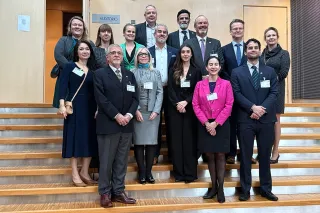The success of electric cars on the markets may be determined by production methods and origin information of battery materials in the future. VTT and Geological Survey of Finland GTK launched a three-year project with their industrial partners to promote the sustainable production methods and traceability of battery materials. A promising starting point for tracing the origin is offered by the fingerprint conserved in the metals, which may directly tell where the metals were mined.
When examining transport emissions, electric cars using renewable electricity undoubtedly represent a step in the direction of sustainability. However, some of the metals used in electric car batteries have been produced at the cost of flagrant compromises on employee safety. At the moment, those buying or manufacturing electric cars cannot verify the origin of their car batteries. The same applies to computers and telephones.
“If it was possible to trace the production chain of battery materials from the battery plant all the way to the mine, certification could be given to sustainably produced batteries. This would give mines and metal refineries with responsible operating practices a competitive advantage, which would encourage the European production chain to develop and grow,” says Päivi Kinnunen, accountable Project Leader for the BATTRACE project at VTT.
The BATTRACE project focuses on the traceability of battery materials and the production processes by which metals are extracted from ore and refined into high-quality raw materials for battery material manufacturers. The aim is an ecologically and economically sustainable production chain.
As the biggest cobalt and nickel producer within the EU, Finland has quite a unique opportunity to participate in the growth of the battery market, expected to be about 20 per cent per year. There are also plans to launch lithium and graphite production in Finland.
“The BATTRACE project offers Finnish operators an excellent opportunity to start open and transparent cooperation and, as a result, to introduce themes Finland considers important to international cooperation, which is currently under preparation. The need, and partly also the pressure to develop traceability come from electric car manufacturers and the European Green Deal initiative, which emphasises the use of sustainably produced raw materials,” says Jani Kiuru, Chief Technology Officer at Finnish Minerals Group.
The unique fingerprint of metals directly indicates the mine of origin
The BATTRACE project will examine methods by which production chains can be monitored and certified in both metals industry and other sectors. Another method supporting the tracing of metals is a fingerprint unique to the ore from a specific region, which is expected to be conserved in metals throughout the processing chain.
The fingerprint refers to, for example, atom-level observations made on the composition of materials. Such features as the various forms of metal atoms, isotopes, may reveal its origin. The fingerprint may also indicate the share of recycled metals, which may become important at the phase when battery metals return to circulation in significant proportions.
“In the project, we examine the mineralogical and geochemical fingerprints of ore and their conservation from ore to product,” says Quentin Dehaine, Post-doctoral Researcher from the Geological Survey of Finland.
In addition to the origin of metals, another factor affecting the sustainability of battery materials are the production methods used for metals. The battery industry requires significantly purer and more highly refined raw materials than the traditional metal industry. The BATTRACE project aims to optimise the metal production processes for the needs of the battery industry and to ensure their sustainability by such means as life-cycle assessments.
The research partners in the BATTRACE project are VTT and Geological Survey of Finland GTK. The total budget of the project is approximately EUR 5.8 million, of which the research project accounts for EUR 2.7 million. The project funding comes from Business Finland and the research partners as well as the companies participating in the project: Finnish Minerals Group, Keliber, Outotec, Valmet Automation, Latitude66, Fennoscandian Resources and Mawson.
Lisätietoja
Päivi Kinnunen, Research Team Leader, Accountable Project Leader
[email protected], tel. +358 40 178 0127
Ville Miettinen, Senior Scientist, Project Manager
[email protected], tel. +358 40 833 8096
Geological Survey of Finland GTK:
Mari Kivinen, Team Manager
[email protected], tel.+358 29 503 2414
Quentin Dehaine (fingerprinting analytics), Post-doctoral Researcher
[email protected], tel. +358 29 503 0334






